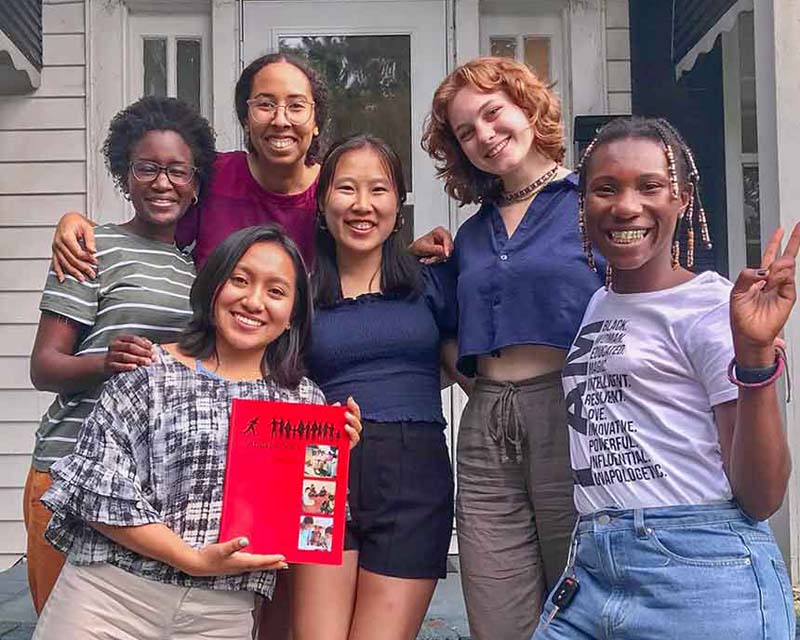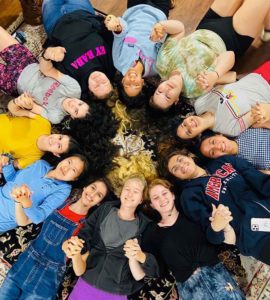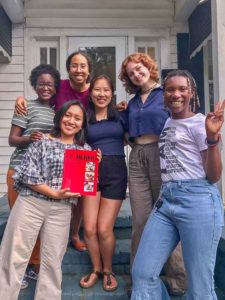



By Karen Withem
“We’re really beginning to understand what it means to put our deeds at the forefront of our learning. It makes the Baha’i Faith so beautiful, alive and growing.” These are the words of Ashiya Gillette, who was part of the 2021 “Summer of Service” (SOS), a month-long outreach program aimed at helping intensify the Baha’i-inspired process of community building in several mid-Atlantic localities.
This year’s SOS program had an unexpected point of learning. A fight between two young participants became an opportunity for constructive action and a “beautiful conversation” between families, in a facilitator’s words, on the power of love and cooperation even when anger is due to racial conflict.
The program, in its ninth year, has a special significance during the centenary of ‘Abdu’l-Baha’s passing in 1921. A presentation about His life as the supreme example of teaching and service in the Baha’i Faith was central to the one-week orientation that kicked off the July program, called “Summer of Service ‘Bout that Action’: Let Deeds Not Words be Your Adorning.”
 The 19 young adult participants hailed from North Carolina, Virginia and Maryland, and were joined by one Baha’i from Canada. After the orientation, they fanned out to five smaller population centers in North Carolina and southern Virginia.
The 19 young adult participants hailed from North Carolina, Virginia and Maryland, and were joined by one Baha’i from Canada. After the orientation, they fanned out to five smaller population centers in North Carolina and southern Virginia.
Mike Mastry, SOS coordinator, notes that the program’s main objective is to foster broad participation in Baha’i community-building activities. “Our secondary aim is to enhance the capacity of youth, and equip them with knowledge, skills and attitudes that prepare them for a lifetime of service to humanity,” Mastry says.
The program has been an important way to spark growth in areas where this activity is just emerging, he says, adding, “Anyone who wishes to spearhead these activities, we work alongside them” regardless of their faith background. He adds that summer outreach programs have been key to sparking increased activity and community-building.
The program was sponsored by the Regional Baha’i Council of the Atlantic States, which serves Delaware, Maryland, North Carolina, Virginia and Washington, DC.
Actions, not words alone
Ashiya Gillette, 21, of Asheville, North Carolina, was one youth who helped turn ideas into deeds in Angier, North Carolina, where she conducted a summer camp with other Baha’i youth leaders.
The camp was in its first week and going smoothly when two pre-teen boys, who lived in neighboring apartment buildings, got into a fight while playing outside after class. Rather than trying to step in and resolve the conflict themselves, Gillette and her SOS teammate Isabel Peirce, 18, acted as facilitators. They spoke with both boys and their families to understand what had sparked the fight.The two families and adult friends included white, Latino and African-American members of the neighborhood. Gillette and Peirce found that the clash had escalated when the white boy aimed a racist slur toward the Latino and his cousin, who was on the Autism spectrum. The Latino boy who threw the punch was very protective of his cousin, but by the time Gillette spoke with him, he already regretted hitting the other child.
The white boy remained upset because in the scuffle he’d lost a cross necklace that his mother had given him, Gillette says. “My sense was that the Latino boy was mature, and could take the first step” toward mending the friendship. “I didn’t want to force them into a conversation and get them to apologize,” Gillette recalls. “I said to him, ‘Let’s just look for the necklace together.’ I was thinking our actions are more indicative of intentions than words at this point, which could be flammable.”
While the boys and other neighborhood kids looked for the necklace, the two families struck up a conversation nearby. Gillette recalls feeling apprehensive that tensions might again escalate. “But we’d been there a week and I knew they were amazing people, and we’d talked about what we could do for this community,” she says. “I knew they were sincere and could work things out.” While the kids looked for the necklace, Gillette and Peirce spoke with the Latina mother and the white boy’s grandfather. “As soon as the grandfather learned that his grandson had said something racist, he told him ‘That’s not okay, you can’t say things like that.’ The energy shifted at that point,” she says.
The search party found the necklace in a patch of grass, and within hours “the kids were over everything, playing volleyball in the parking lot. It was such a beautiful moment.”
The two families, along with other neighbors, had a heartfelt conversation about the harm that racism can do. The white child’s grandfather expressed the intention of helping the boy understand the impact of racist words. “We had a beautiful conversation about how love for our children can overcome our attachment to other things like ego, power and money,” Gillette says.
The grandfather’s best friend, who is African American, “said he believes everything happens for a reason and God is guiding everything,” Peirce says. “He told us, ‘If you hadn’t come into this neighborhood and taught the kids together, we wouldn’t have had this fight. And without the fight, we would never have met as neighbors and gotten to know each other and begun this friendship.’”
Instead of a seemingly small scuffle hardening into estrangement, she saw new friendships born, centered around spiritual principles. One of the adults expressed his intention to continue the children’s camp, because he realized that racism and other diseases of society will not be healed without sustained effort.
Seeing a role for everyone
The SOS program followed a call to action from the National Spiritual Assembly to ensure that appropriate attention is paid to African-American and Indigenous peoples, for the great contributions they have made, and will continue to make in the future, to the manifestation of the spirit within the material world. In developing the 2021 program, its planners prayed and thought about the significance of Baha’u’llah’s likening people of African descent to the pupil of the eye, from which “the light of the spirit shineth forth.”


The youth orientation included study of Ruhi Institute materials for training through service, with the goal of learning how to see everyone as having a role to play.
The year’s unique challenges
Special challenges grew out of COVID-19. “We were restricted this year because of vaccination requirements, and the need for safety in light of the pandemic,” Mastry says. To answer these needs, they drew support from four teams. The logistics and financial teams facilitated travel, host homes and food — similar to support provided in prior years. A health team included a local pediatrician and public health expert. And a fourth team developed a new literacy component for class, with instruction in reading and writing for 11- to 15-year-olds.
Crystalizing the Summer of Service experience
Speaking of her month in Summer of Service, and the scuffle between two boys which sparked compassion and new friendship between their families, Peirce remarks, “You want victory in crisis, this showed us what that’s like. … We didn’t just want to try and teach kids and fix the neighborhood then leave,” she adds. “It was more a goal of establishing relationships that were sustainable.”
Upon returning to her hometown of Hillsborough, North Carolina, Peirce says, “Our community welcomed us home with open arms. We’ve shared our experiences and everyone is learning.”


![]()
![]()
Whether you are exploring the Bahá'í Faith or looking to become an active member, there are various ways you can connect with our community.
Please ensure that all the Required Fields* are completed before submitting.